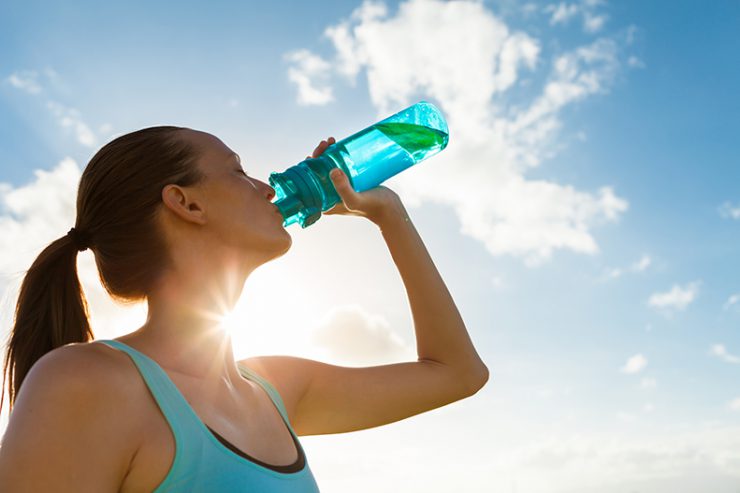
Hydration to achieve improved performance and diminish body pain
Proper hydration assists the body to eliminate wastes and toxins that can cause painful conditions. It is the lubrication your joints need, that reduces joint pain and inflammation.
Water makes up nearly 70 percent of a person’s body weight. It is essential and sustains life.
However, the average person loses nearly 10 cups of water as the body rids itself of toxins through breathing, sweating, and going to the bathroom. For the vital organs, muscles, and brain to function correctly, people need to replenish this fluid to prevent dehydration continually.
Why is hydration so important?
Water is foundational to health. The fluid surrounds the nucleus of every one of the billions of cells in your body. A healthy, hydrated body:
Maintains a stable temperature
Metabolizes energy efficiently
Supports a regular heartbeat and healthy blood pressure level
Reduces the risk of developing kidney stones.
Increases muscle strength and stamina
- Advances better performance
- Improves mental awareness
Two percent reduction in fluid, dehydration starts to cause brain fog. The fluid decrease between 10 to 15 percent is a severe concern, and you should see a doctor.
Dehydration signals
Feeling thirsty? It is the earliest stage of dehydration. Early signs of dehydration also include dry mouth, dry eyes, headache, nausea, dizziness, constipation, confusion, and a lack of energy.
The level of dehydration is noticeable in your urine. If your urine is pale yellow, you are well hydrated. If the color is like apple juice, you need to drink more fluids.
How much fluid is appropriate?
Eight large glasses of water per day are what most experts recommend. However, hydration is not just a regular one size fits all endorsement.
The level of fluid a person needs depends on several unique factors.
Size. A more significant person may need more fluid to maintain proper hydration than a small individual.
Activity Level. Someone who works out or is very active needs more liquid than someone who sits at a desk all day.
Environment. A hot and humid climate prompts sweating, which removes fluid and electrolytes from the body. .So to prevent dehydration, this fluid needs replacing.
Diet. Anyone who eats citric fruits such as oranges. Incorporate salads, and soups in their diet, along with “water-filled” foods, may receive 20 percent of their daily fluid through food.
Many drinks matter when considering proper hydration.
Safe; clean water is the best selection to keep hydrated. Water also has the fewest calories.
However, not everyone enjoys healthy H2O.
Flavor can be added, like fresh or frozen fruits, berries, or cucumbers and mint, which are natural and low in calories.
Add a variety of coffee, teas, and fruit juices to your choices. Consuming fruits and vegetables can be added to your fluid count.
If you are an athlete or work a physical job, you may consider drinking a sports drink formulated to replace sodium and electrolytes lost through sweating.
Avoid some beverages. Those are sugar soft-drinks and sodas which may hydrate you, but are also ladened in high calories and can ruin diets.
Alcohol not only increases calories, but it also keeps you dehydrated.
Time to drink?
When planning your meals, incorporate sufficient quantities of water by introducing it to your daily meal plan.
- Organize to drink water every two or three hours. Even set the alarm on your Smartphone until it becomes a solid practice. One more option is to drink before your main meals. It’s a great way to reduce your food intake.
- Drink two hours before going to bed. It will help you avoid getting up during the night.
- During hot, summer days, drink a beverage every 20 minutes or so.
Calculate to replace fluids after working out.
To begin with, make sure you are appropriately hydrated. Start by weighing yourself. Then after the session, jump on the scales. The difference between your pre- and post-workout weights is the level of fluid to be replenished that will maintain proper hydration levels.
The American College of Sports Medicine recommends drinking water four hours before your activity starts. Drink 15 minutes before your competition or workout. During a game, drink every 20 minutes.
Confusion with thirst and hunger.
Feel hungry, but your stomach isn’t rumbling, drink water and wait 20 minutes or so. If your hunger doesn’t continue, your body probably needs more fluid than more food.
Dehydration can lead to heatstroke
A dehydrated person is more susceptible to heatstroke, including heat exhaustion during warm to hot temperatures. In hot and humid conditions, take notice of signs and symptoms that signal significant loss of body fluids:
- Flushed skin
- Fatigue
- Loss of appetite
- Dizziness
- Anxiety
- Weakness
- Mental Confusion
- Light-headedness
- Dry Cough
- Muscle Cramps
- Nausea
- Vomiting
- Swollen Hands and Feet
If you see these symptoms in someone or yourself, seek medical attention straight away.
Drinking too much can be damaging.
Kidneys can process approximately a litre of water or fluid per hour. By drinking more than that, you can develop a condition referred to as water intoxication and or hyponatremia.
Water intoxication lowers the sodium levels in your bloodstream and floods the inside of your cells. Hyponatremia is a severe state. Firstly, it shows symptoms similar to dehydration; however, it can lead to body seizures, coma, and ultimately the end of life.
So to be well-hydrated means your urine is clear, bathroom visits are frequent, every 2 hours, and when you experience dehydration symptoms, this could suggest that you are drinking too much water. Medical assessment may be required, so contact your doctor for advice.
Balance is essential for proper hydration
Monitor how much you urinate, the color of your urine to help you figure out how much fluid you need to drink. Proper hydration aids in movement, when resting, and for overall well being.
